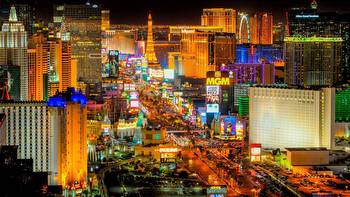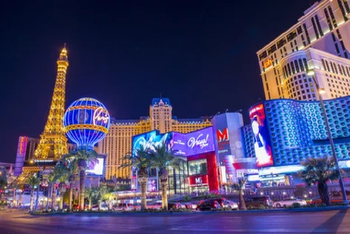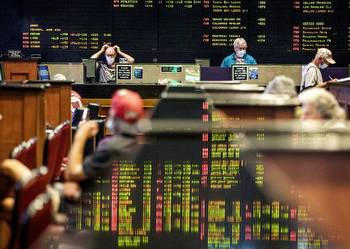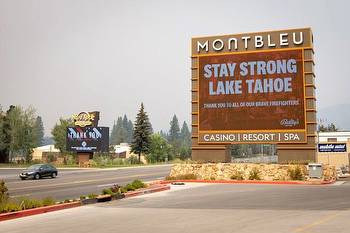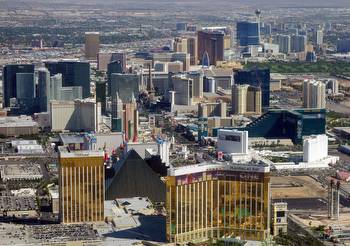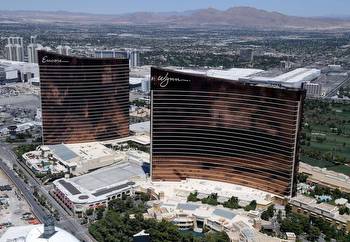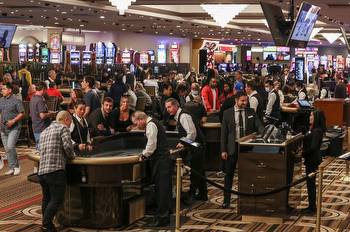Las Vegas Breaks Record In July With $794 Million In Gambling Revenue

It was a very good July for Las Vegas. Nevada collected $794 million in gambling revenue from casinos on The Strip last month, the highest all-time win total for the state, according to revenue numbers published by the Nevada Gaming Control Board. July posted a 46% increase compared to pre-pandemic revenue in July 2019.
Statewide, gaming revenue hit $1.36 billion for the month, making July thefifthconsecutivebillion-dollar month and a 33% increase over July 2019.
In a note published on Thursday, Macquarie Research referred to the outlook for Las Vegas as “upbeat” with the expectation that Sin City will recover to pre-pandemic levels by mid-2022.
“It was a perfect storm,” says Michael Lawton, a senior research analyst for the Nevada Gaming Control Board.
Thanks to a calendar anomaly, July had five weekends, which helped juice the numbers. There were also a lot of events that drew visitors to Sin City, including the Cirque Du Soleil show “O” returning to the Bellagio, Bruno Mar’s residency started at the Park MGM as did Usher’s residency at the Colosseum at Caesars Palace, and the UFC’s matchup between Conor McGregor and Dustin Poirier. It was also the first full month that the brand new Resorts World Las Vegas casino was open.
Resorts World generated between $30 million to $40 million in gross gaming revenue alone, Macquarie estimates, while the Nevada regional casinos continue to “shine,” the research firm writes. The state’s regional casinos outperformed other U.S. regional markets with July revenue up 17% compared to July 2019. Downtown Las Vegas was up 35% versus the same time in 2019.
The number of people who visited Las Vegas in July was up 130% compared to July 2020, according to a report by the Las Vegas Convention and Visitors Authority. Visitor volume is down 10.4% compared with July 2019, which is a big improvement since last summer when it was down more than 60% compared to pre-pandemic levels.
Yet, so far, August isn’t on pace with July, says Lawton. Other factors like the Delta variant and schools opening back up for the year could result in softer revenue numbers. “But I’ve been wrong every month,” he says.
Nearly half a year of record-breaking gaming revenue does not signal that the recovery has quickened its pace. Colin Mansfield, an analyst from Fitch Ratings, says the July revenue numbers were impressive, but the recovery timeline has changed. Mansfield says Fitch is still predicting Las Vegas to fully recover in 2023.
“[The last five months] really just exemplifies the pent up demand of domestic leisure tourism in the United States,” says Mansfield.
It’s difficult to predict what the next couple of months have in store for Sin City as the Delta variant continues to spread and vaccination rates stall, he says. International travel, group and convention business is still missing, all factors that are needed for a full recovery.
“The trend is going in the wrong direction from a case perspective and that's not good for group business,” says Mansfield. “There's still not enough evidence on the convention recovery and international recovery to sway us one way or the other yet on bringing that recovery forward.”
Mansfield says he’s not predicting property closures like during the beginning of the pandemic in 2020, but if capacity limits go back into effect on casino floors, or if vaccine mandates for certain events become more pervasive throughout the city, it will act as “friction” and slow down the recovery.
The only bad thing about July, he says, is that it didn’t last longer. “July was a was a very strong month, across the entire country for a lot of different industries. But it lasted too short—it felt like we were out [of the pandemic] and then delta came ,” he says.
As for Lawton, he’s not optimistic that the five months of record-breaking revenue can go on for too much longer.
“No one predicted this and if you did, you would’ve been laughed at,” Lawton says. “But the billion-dollar trend won’t continue forever.”








